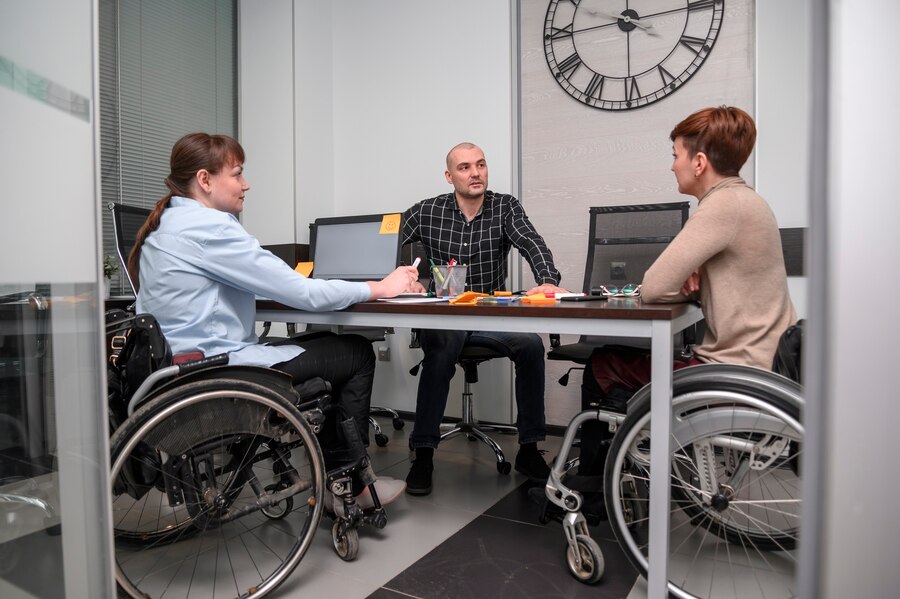The Social Security Administration (SSA) offers several types of disability benefits, the two most common ones being Social Security Disability Insurance (SSDI) and Supplemental Security Income (SSI).
Some of these programs are for unmarried family members of a disabled person, meaning that getting married would make that person ineligible for the benefit.
If your disability benefit is based on your work record, changing your marital status won’t impact your payments. However, changes in your marital status can affect your disability case if you collect benefits as a family member (dependant).
Marriage and disability benefits eligibility is an intricate topic, so for this article, we asked a seasoned disability law firm—Pinyerd Law—to shed some light on this matter.
Can Marriage Affect Your Social Security Disability Benefits?
Before diving into how marriage impacts disability benefits, it’s crucial to understand the different types of disability programs. There are 3 main types of disability benefits you can apply depending on your situation, and marriage affects them all differently.
SSDI
Social Security Disability Insurance (SSDI) is a benefit based on your work taxes to the Social Security Administration (SSA). To qualify for this program, one must have worked long enough to collect enough work credits through taxes. Claimants must also have a qualifying disability that is expected to last and prevent them from working for at least 12 months.
SSI
Supplemental Security Income (SSI) is another program from the SSA, but individuals don’t need to have paid work taxes to be eligible. This benefit supports individuals with low incomes or resources who have a disability stopping them from working. This program places strict limits on the claimant’s earnings and assets. To qualify, you must be 65 or older and/or have a disability and have little to no income or resources.
DAC
Disabled Adult Child (DAC) benefits disabled adults whose parents or guardians receive Social Security retirement or disability benefits. To be eligible, the individual must have developed their disability before turning 22, be at least 18 years old, and be unmarried. The disabled adult child doesn’t need to have worked and paid taxes since the benefit is based on their parent’s earning records.
When Does Changing Your Marital Status Impact Disability Benefits?
How getting married or divorced will impact your Social Security disability benefits depends on the type of benefit you collect and if you receive it on your own record or someone else’s records.
You Have SSDI on Your Own Records
A common question among many SSDI beneficiaries is whether getting married will affect their monthly payments and benefits. When you collect SSDI benefits based on your own records – you paid enough takes to the SSA through previous jobs – getting married or divorced won’t affect your case.
You Have SSDI on A Family Member’s Records
If you collect SSDI benefits through someone else’s records, changing your marital status might affect your qualification. Let’s explore each specific case:
- Widow/Widower: Widows and widowers with a disability can claim Social Security benefits through their deceased husband or wife’s SSA tax records. That benefit is known as Disabled Widow(er)’s Benefits (DWB) or survivor spouse benefits. The criteria include:
- Be between the ages of 50 and 60
- Have a qualifying disability
- Have been married to the deceased spouse for a minimum of 9 months before their death.
If you are disabled and remarried before 50, you can’t receive benefits as a surviving spouse. But if you marry after turning 50, you can still get Disabled Widow(er)’s Benefits.
- Divorced Spouse Benefits: If you have been married to your ex for 10 years or longer and are over 62, you might be entitled to collect Social Security benefits based on your ex’s records. If approved, you can receive up to 50% of your ex-spouse’s benefits. However, if you remarry, you are no longer eligible to receive SSDI through your ex’s working history.
- Child Benefits: For disabled adult children, or DAC, their benefits are based on their parents’ or guardians’ work records. That way, if their parents can no longer provide for them because they also have a disability, are retired, or are deceased, this program supports the DAC.
If a disabled adult child marries, they will likely lose their benefits, including monthly payments and Medicare coverage. However, a few exceptions exist, such as when the beneficiary marries another Social Security benefits recipient.
How Getting Married Affects SSI Benefits
Unlike other Social Security disability benefits, such as DAC or survivor spouse, an SSI beneficiary can marry without the benefit being automatically terminated. Nevertheless, certain factors, such as your new spouse’s work salary or earnings, can affect your eligibility.
Since Supplemental Security Income is a need-based benefit, the SSA will review all your earnings and assets when evaluating your application. If your salary, other types of income, and assets surpass the allowed cap, you won’t be eligible to collect SSI.
You are an SSI beneficiary and get married, the SSA will also take into account your spouse’s income. If your and your spouse’s income and resources exceed the maximum allowed, you’ll stop receiving SSI.
If your spouse also receives SSI, the SSA will automatically reduce your benefits from an individual to a couple’s SSI—as of 2024, $943 for an individual and $1,415 for couples. Likewise, if your spouse is not receiving SSI but the couple is eligible, your sum will be increased.
Final Thoughts
Navigating Social Security disability benefits rules when getting married can be confusing. We hope this guide helped you understand how the different programs work.
When your marital status changes, it’s crucial that you maintain open communication and transparency with the SSA. This will prevent potential penalties and guarantee that you receive the correct amount under the law.
If you have more questions, you can reach out to a professional disability law attorney. They will provide personalized advice to enhance your case and help you secure or maintain your disability benefits.










